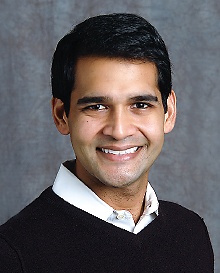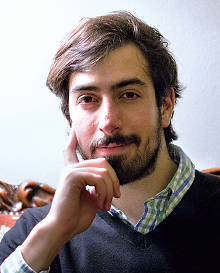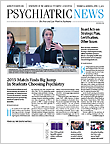Being a physician raises the risk for suicide, and interns may be especially vulnerable as they cope with burnout, stress, and depression, said the authors of a “Viewpoint” piece in the March 4 JAMA Psychiatry. They are advocating a national response to help protect the mental health of physicians in training.
The authors noted that they felt compelled to write after learning that two medical interns in New York City died by suicide last fall and after reading a heartfelt New York Times op-ed piece by a Yale School of Medicine intern, lead author Ravi Shah, M.D., told Psychiatric News. Shah is a third-year resident in the Department of Psychiatry at Columbia University Medical Center and APA’s resident-fellow member trustee-elect.
Shah reflected on the tragedy and highlighted the link among medical training, isolation, depression, and trainee suicide.
“Data suggest that medical training itself might be a risk factor for developing mental health issues,” especially among residents, Shah said. “Relocation, a major change in sleep habits, and a major increase in workload—these create risk for depression.” But research on physician mental health, especially among residents, is limited, he added.
Shah said that the statistics mentioned in the Times piece might not be on many physicians’ radar screens, including the fact that physicians are twice as likely to take their own lives as are nonphysicians and that female physicians are three times as likely to do so as their male counterparts, according to the American Foundation for Suicide Prevention (AFSP). It is also estimated that 300 to 400 physicians die by suicide every year.
The leap from medical student to physician is a big shift, said coauthor Carol Bernstein, M.D., a past president of APA and an associate professor of psychiatry, vice chair for education, and director of residency training at New York University School of Medicine.
“It is very different to be a physician who is responsible for patients than to be a medical student. There is a significant psychological difference. You feel much more accountable,” Bernstein told Psychiatric News. “The environment can be extremely stressful. Internship is an experience you never forget.”
The third coauthor of the “Viewpoint” piece, Matthew Goldman, M.D., M.S., said the news of the suicides was “a big wake-up call.” As resilient as he and his future-physician colleagues felt in medical school, he said, it did not necessarily translate to being able to tolerate the stressors of residency.
The news of the suicides “brought it home for a lot of us. I think knowing that mental illness is something that is possible among people at this stage in our training made us think a lot about what we are doing here and ask ourselves, ‘how am I coping with this experience?’ ” said Goldman, a first-year resident in the Department of Psychiatry at Columbia University Medical Center.
“It’s important to empower trainees with the knowledge that mental illness may be a factor during residency [and] that our training puts us at risk for developing mental illness. That’s an important conversation to have,” he added.
In 2003, JAMA published guidelines developed by AFSP and a group of physicians and other experts on physician depression and suicide to encourage suicide prevention and depression treatment for physicians, but 12 years later the proposed interventions have not been widely adopted, Ravi and his coauthors said in their “Viewpoints” piece. They noted that while the Accreditation Council for Graduate Medical Education requires programs to have processes to assess trainee fatigue and burnout and allow for access to counseling services, the requirements need to be expanded to create prevention programs that help residents avoid burnout.
Shah and colleagues said it’s time to develop a comprehensive national training system for residents and their supervisors that addresses education, screening, and treatment for mental illness. These efforts could alleviate depression and suicidal thoughts during the early years of stressful medical training, said Shah.
They described two such programs that have had positive effects—one in the U.S. Air Force (USAF) and another at the University of California, San Diego (UCSD). The USAF’s program, launched in the 1990s, tasks certain supervisors as mental health gatekeepers who are responsible for identifying at-risk individuals and channeling them to appropriate mental health services. The USAF program includes a mental health screening questionnaire for enrollees of military health care plans. Its efforts have contributed to a decline in suicides from 16.4 to 9.4 per 100,000 members from 1994 to 1998.
UCSD launched its Suicide Prevention and Depression Awareness Program in 2009 for medical students, residents, and faculty physicians. It includes an anonymous and confidential mental health screening process, assessment, and referral for treatment. An additional education program consists of a medical school–wide campaign that shares information on physician burnout, depression, and suicide as part of the training program. By talking about mental health issues during Grand Rounds and designating medical school leaders to discuss depression with colleagues and physicians in training, the program aims to destigmatize seeking help for depression.
Shah said that even if an individual realizes he or she has a mental health problem, the time crunch with which interns are constantly grappling may make it impossible to seek support, so preventive and treatment services need to be accessible, and education about physician depression and burnout needs to be incorporated into the curriculum.
The JAMA Psychiatry article includes a box, “Guidelines to Promote Mental Health Among Residents and Fellows,” that highlights actions such as engaging program leaders in education that promote resident wellness, screening for depression and substance abuse, and ensuring access to care and confidential, timely follow-up for trainees who have screened positive for depression or substance abuse.
This is a good time to address physician mental health, said Goldman. “There are major culture shifts going on right now. The country is undergoing a change in attitude toward mental health,” and the physician workforce needs to be part of the current conversation, he added. ■
“Why Do Doctors Commit Suicide” can be accessed
here. “Depression and Suicide Among Physician Trainees” is available
here.



